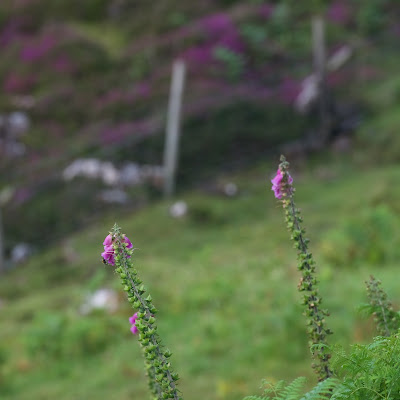Friday, 26 July 2019
Wednesday, 24 July 2019
Walter and the Sparrows
There are lots and lots of Sparrows at Treshnish, and they are a delight to watch. There are lots of fledglings around and still some chirping from nests in the eaves of the steading. However Walter doesn't like them. I don't know if it is that their chattering is too high pitched for his ears or what, but when he hears a big gaggle of them, he runs at high speed to the base of the tree or bush they might be in, and tries to disturb them. They then fly off in a cloud to another bush, and he runs after them. Luckily he cannot fly so they are perfectly safe.
Cap, at 14, takes life quite slowly these days.
Walter was shorn last week. He has such long hair, he must feel a lot cooler now!
Foxgloves are still flowering, and attracting lots of Bees.
This year we are in a new environmental scheme and the change in focus of the scheme has altered our grazing management. Today Farmer put sheep into the Black Park. For the last 15 years or so we have had to exclude sheep from this field until the end of August or even September. This long summer grazing break allowed all the flowers to safely set seed before being nibbled off by the sheep. It goes against the grain to graze it now, as if the wild flowers don't matter this summer.
I am relieved that the Greater butterfly, Fragrant and Northern marsh orchids have all finished flowering and started fruiting - hopefully the sheep won't give them a second glance now. The Devils bit scabious hasn't started flowering yet, and the sheep are bound to dine out on them once they do flower. Same with the Knapweed.
So after 5 years of this new grazing management, it will be interesting (slightly nerve-racking) to see how this affects the abundance of wild flowers we have been used to in the past.
Left to right: Coco, Nyje, Jan, Farmer and Walter (as always at Farmer's side). Cap is leading the way ahead of Farmer, not really visible.
We have about 30 Rock doves now hanging round the farmyard all the time. Checking out the bird feeders, which Farmer keeps moving in the hope they won't be able to extract any grain. But they always outwit him. They fly into the hen run and just help themselves from the hopper of grain.
Every now and then we find feathers, and know that a bird of prey has caught one.
Subscribe to:
Comments (Atom)



























